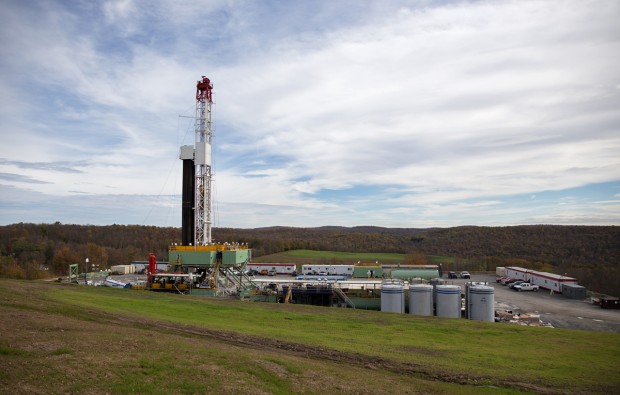Marcellus Shale boom cuts costs for Pennsylvania ratepayers
-
Susan Phillips

Lindsay Lazarski/WHYY
A Cabot Oil and Gas well site in Northeast Pennsylvania. The Marcellus Shale gas boom has reduced utility bills for residents by 40 percent on average.
Pennsylvania’s Marcellus Shale gas boom has significantly cut energy costs for consumers across the state, according to a new study released Friday by the University of Pennsylvania. Residential gas customers have seen a price drop of 40 percent on average, compared to costs ten years ago. Before Marcellus production ramped up, Pennsylvania produced just one percent of the nation’s supply of natural gas, but today the state accounts for 16 percent. Production jumped 2,800 percent in the ten-year period covered by the report.
“That additional supply has helped drive prices down at a significant savings for consumers.” said Christina Simeone, policy director with Penn’s Kleinman Center for Energy Policy and author of “Pennsylvania’s Gas Decade.”
Simeone says electricity prices have also gone down, due to the shift from coal to natural gas power plants.
“The electrical power sector is now the number one user of gas both in Pennsylvania and nationally,” she said.
The costs for power companies dropped on average 79 percent in the past decade. Simeone says the reduction in the price of gas and electricity for ratepayers has helped reduce the number of utility shut-offs across the state.
The cost reductions are for the price of the residential gas only. Distribution charges have actually increased as utilities work to replace old and dangerous infrastructure.
“Consumers are seeing their bills go down, but not down as much if these system improvements were not taking place,” she said.
Simeone says prices will eventually go up following an increase in newly built pipelines to ship Pennsylvania gas across the nation and overseas. The Federal Energy Regulatory Commission has approved 53 new pipeline projects, which Simeone says would double the state’s current pipeline capacity. But it’s unclear how much of a price increase would be caused by the new pipelines.
“Unlike debates about carbon tax and severance tax, which are very public debates, policy makers are not very aware of the price implications of pipelines,” she said. The report recommends more dialog on the economic impact of the pipeline building boom.
















